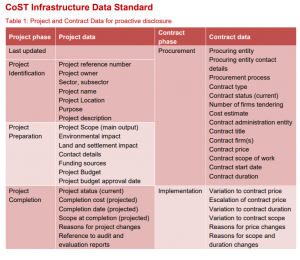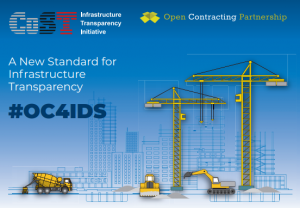Our tools and standards help relevant stakeholders to promote transparency, accountability and participation in infrastructure planning and delivery. Our products range from first-of -their-kind innovations to established industry standards for infrastructure data publication and validation.
CoST IDS
The CoST Infrastructure Data Standard (CoST IDS) promotes the publication (disclosure) of 40 data points to be published at key stages of the project cycle including identification, preparation, completion, procurement and implementation. 
The CoST IDS promotes the publication of both project and contract data. Project data relates to data on a specific project, overseen by a single project owner and the budget authority. Contract data relates to the legal or officially binding agreement between a procuring entity, and a contractor, to deliver the project activities.
This data can be shared in two ways, through proactive and reactive publication. Proactive publication relates to data shared ‘without official request’. This data is shared in a clear and usable format, and through a public medium such as an online portal.
Reactive publication is when additional information is required ‘upon request’. This data is made available to the requesting party in a usable form, in an accessible place and under a specified set of conditions.
OC4IDS
In partnership with Open Contracting Partnership (OCP) and Open Data Services, we launched the Open Contracting for Infrastructure Data Standard (OC4IDS). The OC4IDS utilises the expertise of us and OCP, combining contract level publication using the Open Contracting Data Standard with project-level publication using the CoST IDS. In doing so, the OC4IDS connects previously siloed information to create a view of a bigger picture of infrastructure investment and delivery.
The OC4IDS transforms paper-based processes into machine-readable open data which boosts efficiency, strengthens competition and delivers better value for money. It provides detailed guidance on what – and how – to publish data at three levels:
- The project level, covering identification, preparation, implementation and completion phases
- The contracting summary level, covering the contracts for project design, construction and supervision
- The contract process detail level, where updates and changes to a contract can be monitored.
On an existing data portal, an OC4IDS export option can be added to the system. This means project information can be compared, and supports the development of common tools for the analysis of infrastructure project information.
On a new data portal, OC4IDS can be used to structure the data collection. OC4IDS supports the collection of well structured, clear and unambiguous data, comparable across contexts. It can integrate both with existing open contracting data sources, and also where structured, open contracting data is not available.
Alongside OCP, we support CoST members to integrate the OC4IDS into their systems, as well as any other entity with an interest or need to use it.
The OC4IDS promotes the use of online platforms to make data available in real time, giving residents far better access to information and helps to facilitate more meaningful engagement. Throughout the last few years, there have been innovative data portals developed by our members.
Our members have also worked to achieve legal mandates on the publication of data using the OC4IDS and CoST IDS.
In 2024, we expanded the OC4IDS data points, with an additional 78 data points, to include more focus on sustainability and climate finance. This includes looking at aspects such as indigenous land, greenhouse gas emissions, and carbon footprint. Like the CoST IDS, the points can be adapted to that location’s contexts.
For more information on the OC4IDS, see the OC4IDS Toolkit. Find out about how the OC4IDS has been used in our partnerships page and impact stories.Take a look at our resources page to find out more about our members’ data portals.
Infrastructure Transparency Index
The Infrastructure Transparency Index (ITI) measures levels of transparency and the quality of data publication processes in public infrastructure at national and sub-national levels. Collaboratively designed and based on international good practice, its objective is to provide stakeholders with quality information that serves to promote transparency, accountability, participation and improve the management of public infrastructure.
The methodology sets out how scores are calculated across enabling transparency; capacities and processes; citizen participation and data publication. The individual scores are then used to generate an index that compares other evaluated procuring entities.
More information about the ITI can be found on the ITI website.
